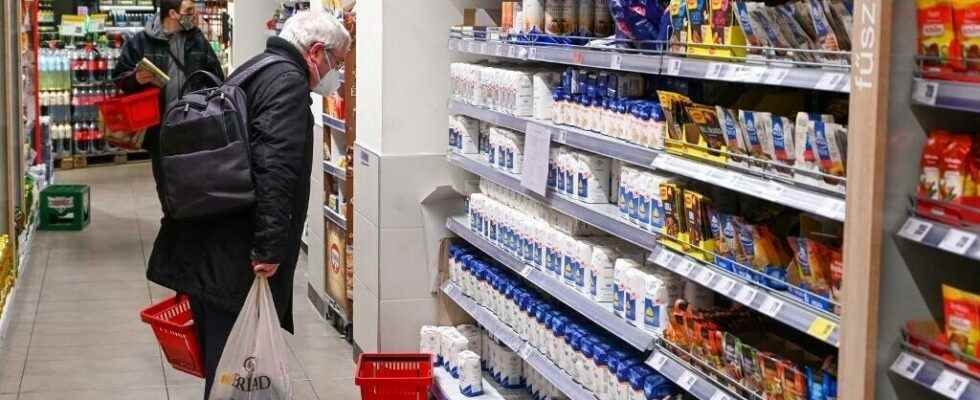On Thursday, August 4, the Bank of England announced that it was going to raise its key rates by 50 basis points, a drastic measure to counter inflation. She also warned that the United Kingdom would enter a recession until the end of 2023. Faced with soaring prices, European states are looking for measures to fight inflation and support household purchasing power.
In the Netherlands too, inflation is particularly high. According to the latest figures from the Netherlands Institute of Statistics, published Thursday, August 4, inflation has reached the 10% mark, a first in the country since 1975.
At the top of the list of products and services where inflation hits the hardest here in the Netherlands, we of course find energy first, reports our correspondent in The Hague, Antoine Mouteau. According to CBS, the Netherlands Statistical Institute, last July the prices of electricity and gas in particular increased by 108% compared to a year earlier, in July 2021. And this despite the government’s decision to make temporarily reduce the VAT on energy from 21 to 9%, a measure that came into force last month.
Rents are also affected. They have on average undergone an increase of 3% against less than 1% a year ago. And this, in particular, in the context of the very serious housing crisis which has been shaking the Netherlands for several years now. The prices of food products have increased by more than 12%.
And the Dutch government does not even hide it, the situation should get worse. ” We must understand that we will collectively become a little poorer said Finance Minister Sigrid Kaag in early July.
► To read also: Bank of England announces another rate hike
Seventeen billion to deal with the crisis in Italy
The resigning President of the Council, Mario Draghi, in charge of current affairs until the elections on September 25, has signed his last wide-ranging economic decree: 17 billion euros are intended to alleviate the effects of the energy crisis and the inflation without increasing the Italian public debt, reports our correspondent in Rome, Anne Le Nir.
In total, no less than 52 billion euros have been released since January 2022 to support Italians hard hit by inflation, which is at its highest level since 1986, and by exorbitant energy costs. And in particular those of electricity, because Italy abandoned nuclear power in 1987 and must use gas to produce it. During his press conference, Mario Draghi cited several measures.
For example, the extension of the reduction of 30 euro cents per liter of petrol until the end of September. A single allowance of 200 euros to enable low-income families to partially compensate for their loss of purchasing power. Or an increase in tax credits for agricultural businesses, literally undermined by drought.
► To listen also: United States, savings at all levels
The French Parliament definitively adopts the second part of the purchasing power package
Parliament definitively adopted Thursday, by a final vote of the Senate after that of the National Assembly, the second part of the purchasing power package. After a first part validated on Wednesday comprising 20 billion euros in expenditure, the rectified budget for 2022 (PLFR) opens 44 billion euros in credits, including 9.7 to finance the 100% renationalization of EDF. In particular, it provides for the continuation of the tariff shield on energy and the fuel discount, and the revaluation of the index point for civil servants.
“ These first weeks were decisive. The adoption of three important texts is also good news for our democracy. We have built solutions with parliamentarians from the majority and members of the opposition from the Republican arch. We proved that the compromise, requested by the French, was possible and accessible “said Elisabeth Borne. ” The value of work is recognized and supported “, for his part estimated the general rapporteur LR Jean-François Husson, also underlining the commitment of the Senate to ” guarantee local authorities the means for their actions “. This PLFR, he added, “ must definitely make us aware of the budgetary rigor and sobriety that Parliament and the executive must show “.
► Also to listen: Shortages, purchasing power: anti-crisis recipes
Jean-Claude Requier, president of the RDSE group, noted “ a deterioration in the public balance of more than 15 billion euros “. Centrist Sylvie Vermeillet regretted that Parliament had not introduced a tax on “superprofits”, considering that ” asking for an effort of solidarity (…) from companies that have generated exceptional profits, even though the State has massively subsidized the economy in the context of the Covid epidemic, is right “. The left denounced the convergence between the right and the presidential majority, which will undermine one after another the interests of the popular classes “, according to the president of the CRCE group Eliane Assassi. Ecologist Daniel Breuiller castigated ” the agreement between two liberal visions “. Socialists voted against serious social setbacks “, in the words of their leader on this text, Rémi Féraud.
► To read also: “It does not stop, this inflation!”: in Turkey, the price of fuel explodes
(and with AFP)
